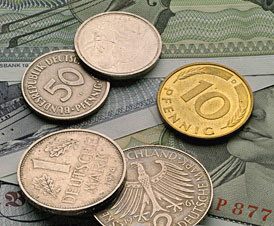German business confidence to slip, analysts forecast
 Berlin - Business confidence in Germany slipped in March, economists expect a key survey to be released Wednesday to say, as boardrooms in Europe's biggest economy face up to the global recession.
Berlin - Business confidence in Germany slipped in March, economists expect a key survey to be released Wednesday to say, as boardrooms in Europe's biggest economy face up to the global recession.
In a major test of the economic mood in Europe, the closely- watched Ifo business confidence index is forecast to have edged down to 82.2 points this month after falling to an 18-year low of 82.6 in February.
Based on a survey of 7,000 German executives and drawn up by the Munich-based Ifo economic research institute, the March index is likely to add to expectations that the European Central Bank will cut rates again next week in a bid to spur economic growth.
A factor dragging the index down in March is expected to be another sharp fall in the business leaders' assessment of the current economic climate in Germany.
At the same time, however, the indicator's component gauging expectations six months down the track is forecast to have gained ground on hopes of an economic upturn later in the year.
This comes in the wake of the slew of major fiscal stimulus plans unveiled by governments around the world and a round of hefty global interest rate cuts.
While the March Ifo indicator gauging current business conditions is tipped to slump from 84.3 points in February to 82.9 points this month, the index's expectations component is forecast to jump to 81.8 in March from 80.9 last month.
But many economists believe that the German economy might now have started to bottom out, after the implosion of America's Lehman Brothers in September helped to send the world economy into a sharp decline in the last months of 2008.
Indeed, the release of the Ifo survey is also likely to follow a batch of more positive readings from other recent economic sentiment surveys.
Considered a bellwether of the mood in the 16-member eurozone economy, Belgium's business confidence survey unexpectedly rose to minus 28.6 points in March from minus 31.6 in February. Analysts had forecast a fall to 32 points.
At the same time, the preliminary composite purchasing managers' index (PMI) for the eurozone, which draws together the manufacturing and services output indices, rose from 36.2 in February to 37.6 in March.
German investor confidence recorded a surprise increase in March to record its fifth consecutive monthly rise, a key indicator released last week showed, amid hopes of further rate cuts and a turnaround in Germany's economy later in the year.
After posting a big jump in February, the Mannheim-based Centre for European Economic Research (ZEW) said its index measuring the sentiment among analysts and institutional investors edged up to minus 3.5 points this month from minus 5.8 last month.
But while those responding to the ZEW survey believe that the government stimulus packages and central bank rate cuts will help to lay the foundations for a pickup in the German economy six months down the track, they remained downbeat about current business conditions.
The component of the ZEW indicator measuring existing economic situation in Germany slipped in March by 3.2 points to minus 89.4 points.
That said, however, grim economic data and downward revisions to economic have continued to roll in as key export market dry up, order books contract and production plummets.
Commerzbank AG this week forecast that the economy could shrink by a dramatic 6 or 7 per cent this year amid a fresh batch of cuts in projections for the economic growth outlook. (dpa)